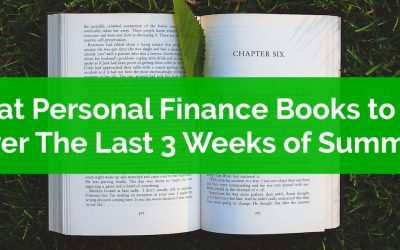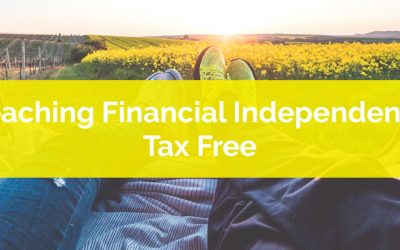Thank you for subscribing!
We can’t wait to send you our next post, you’re going to love it! In the mean time, check out our free resources.
Check out our latest blog posts…
3 Great Personal Finance Books To Read Over The Last 3 Weeks of Summer
Summer time is a great time to read. It’s hot outside, you don’t feel like moving around, you just want to sit and relax. A book is a great way to enjoy those lazy summer days. With vacation days and long weekends there are plenty of opportunities to read a good book. Personal finance books might not be your first choice for a casual summer read but I’ve got three great personal finance books that you should definitely consider this summer.
Of course, there aren’t just three great personal finance books, there are literally hundreds of great books out there. There are books about investing, about financial independence, and about retirement. There are books about budgeting and managing expenses. There are books about how to pay off debt as quickly as possible and how to start saving for the future. There are general personal finance books too, which touch on all these topics and then some.
With so many great books to choose from, and so little time to read them, you need to make some tough decisions. Which book will you put on the top of your list? We have three recommendations that you should consider putting at the top of your list this summer.
Think You Control Your Own Spending? Think Again!
Habits drive a lot of what we do. Habits are subconscious and they form in weird ways. Did you know that a lot of our spending is driven by past decisions?
We all have this weird desire for coherence. We want things to be consistent. We judge current spending decisions based on past spending decisions. We want to keep things consistent so we make decisions based on what we did in the past (or what we’ve seen other people do).
We’d like to think we’re in control of our spending but that’s not really the case. We’re influenced by things we purchased in the past, or things friends have purchase, or co-workers, or even our family. We’re even influenced by random people we have no relationship with like the people in advertisements.
Arbitrary coherence is the idea that the first decision we make, or the first piece of information we receive regarding a decision, is arbitrary, we don’t have any reference point or anchor to evaluate this new piece of information so it’s very arbitrary. But after we get that initial piece of information we start to use it as a reference point, and subsequent decisions are made using it as a reference.
Reaching Financial Independence Tax Free
Financial independence is a goal for many people. Financial independence is when work becomes optional. It’s when your investments are large enough to support your annual spending indefinitely, without the need for employment income. Reaching financial independence frees you from the typical work/money/time equation. When you reach financial independence you no longer have to trade your time for money.
How much you need to reach financial independence is different for everyone, but the quick and most common metric is 25 times your annual spending. Once you reach this level of savings and investments (not including your home) you can withdraw 4% of your portfolio indefinitely. With the right portfolio your investments will grow enough each year to pay you 4% of the original principal and still keep up with inflation.
Taxes are obviously a big consideration when growing your investments. Tax free growth allows your investments to grow faster and lets you hit your goals earlier.
In Canada we have two main accounts that provide tax free growth, the TFSA and RRSP. With the TFSA you pay tax now but don’t pay tax later. With the RRSP you don’t pay tax now, but you do pay tax later. Regardless of when you pay the tax, the investment growth within an RRSP or a TFSA is tax free. Using your TFSA and your RRSP to its full potential means you can hit financial independence much faster.



